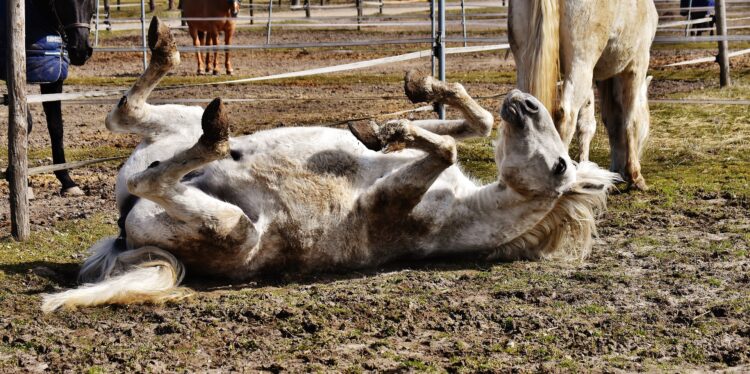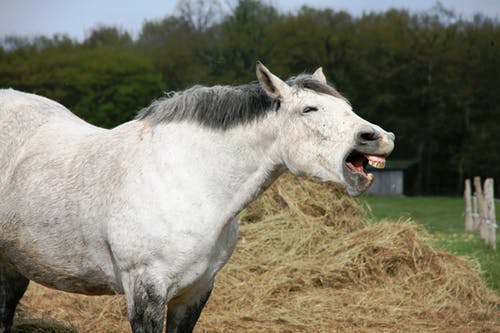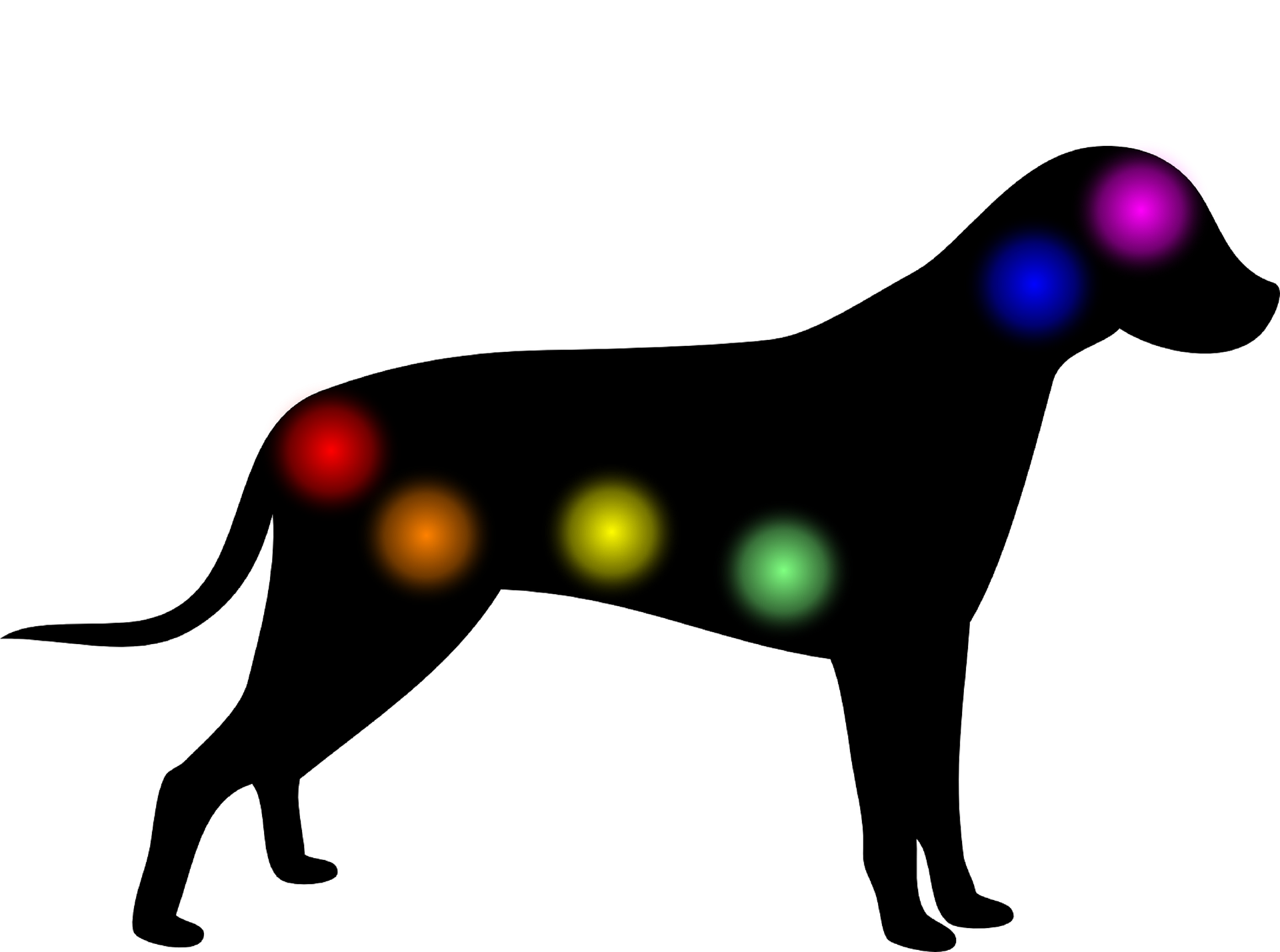Guest post courtesy of Lisa Carter. The views and opinions expressed in this article are those of the guest author and do not necessarily represent the views of Val Heart & Heart Communication Enterprises Inc. This article was previously published July 5, 2012 and was updated on May 22, 2023
Holistic Care Tips to Relieve Colic in Horses
No one yet understands why some horses are more prone to colic than others. One thing is certain though – colic in horses can be fatal if left untreated and should be dealt with as an emergency. If you suspect your horse is colicky, take immediate action by calling your veterinarian. While you await the arrival of your veterinarian you can try some of these natural remedies to relieve colic in horses.
Homeopathy Remedies For Colic
Homeopathic medicines are a common natural therapy to relieve colic in horses. It is best to consult a holistic veterinarian to determine dosing and the best treatment for your situation and symptoms. Here are some general guidelines to determine what you might want to have on hand and what to use for certain types of symptoms.
- Aconite – Used for colic triggered by fear. Best if used early, when colic symptoms are first noticed. Symptoms for aconite use are: sudden high fever, a rapid pulse, and restlessness or fearful behavior.
- Belladonna – Best used for sudden intense onset of severe colic symptoms. The horse displays violent behavior such as striking, biting or kicking, and may show heightened sensitivity to touch, light and noise. Other symptoms may include dilated pupils, dry mouth and hot to the touch.

- Arsenicum Album – Use if your horse has very watery and dark diarrhea. The stool may have a foul odor to it. The horse appears thirsty but will only take small frequent amounts of water.
- Chamomilla – Use for horses with symptoms of excessive flatulence and/or diarrhea consisting of green stool that smells of rotten eggs. The horse may also display violent behavior such as kicking out, grinding teeth or screaming. Do not use if the horse is constipated.
- Colocynthis – Use in cases where the horse wants to roll or lie down or if the cause of the colic is unknown. Other symptoms may include sporadic but severe cramping pain.
- Magnesia Phosphorica – Use with symptoms of muscle spasms, twitching eyelids or extremities, bloated and/or kicking at abdomen.
- Colchicum – Use with very gassy symptoms – frequent spasms accompanied by a bloated abdomen and very loud gut sounds. The horse may also be kicking at abdomen but doesn’t want to move much. Other symptoms may include abdomen being hot to the touch and constipation.
- Carbo Vegetabilis – Use with shocky horses. Symptoms include weakness or horse has collapsed, bluish tinge of the mucous membranes, shallow breathing, bloating or excessive flatulence.
- Nux vomica – Can be used to increase gut motility when used during colic associated with a blockage or severe abdominal spasms.
Equine Massage Therapy
I have used equine massage on multiple occasions for horses that are in the early stages of colic. Using equine massage can be a very beneficial natural therapy if a horse is colicky by helping the horse to relax and providing much needed pain relief. Massage also helps increase circulation and in conjunction with the muscle relaxation can aide gut motility with certain types of colic. This modality works extremely well in conjunction with acupressure in relieving colic symptoms and can significantly lessen the severity of a colic episode while you await the arrival of your veterinarian.
Equine Acupuncture and Acupressure
Acupuncture and acupressure are ancient Chinese bodywork therapies that are based on the concept of “life energy” or “Chi” which flows through pathways in the body called “meridians”. Acupressure uses finger pressure and acupuncture uses needles to access these meridians in order to “unblock” the pathways and allow the free flow of Chi through the body, restoring balance and health. There are specific points along the meridians of the body that effect each organ, including the stomach and intestines. By applying pressure to these points you can help ease colic symptoms in the horse.
You can find an excellent article on acupressure for colic with the associated points for each type of colic here: http://www.animalacupressure.com/tg_site/articles/actionforcolic.html
Essential Oils For Horse Colic
Essential Oils can be a powerful first aide tool for your barn. They are easy to use and horses react very well to them. You can often find pre-assembled emergency first aide kits online or can create your own. The recommended essential oils for a horse colic are:
- Di-Gize Essential Oil – a blend of eight different essential oils and known to aide relaxation, the prevention of diarrhea, intestinal spasms, digesting toxic material as well as provide an overall soothing effect on the digestive system.
- Peppermint Essential Oil – good for headaches and upset stomach.
- Ginger Essential Oil – good for digestive upsets, used as a heart tonic and aides in circulation.
- Tarragon Essential Oil – good to combat digestive conditions, indigestion, hiccups, urinary tract infections and menstrual problems.
The great thing about all of the above-mentioned natural colic remedies is that they can be used alone or in combination with each other. They are all very complimentary and should not interfere with traditional treatments that your veterinarian might recommend. All can be performed at the earliest signs of a colic and while you are waiting for your veterinarian.
Determining the root cause of your horse’s colic can be very challenging as there are so many variables involved and triggers for colic in horses. However, with the help of your veterinarian, when you do identify the culprit it will go a long way in determining a course of preventive care for your horse and help eliminate the possibility of another colic in your horse’s future. Prevention is the best medicine!
If you have other natural remedies that you’d like to share please feel free to leave a comment below. We’d love to hear from you!
For more information on Horse Colic please visit http://horseconsult.wordpress.com/first-aid/colic/
Enjoy this article about colic in horses? Here are 3 more of my most popular articles:
Is My Dog Happy? Here’s How to Know For Sure
Soul Groups: Reincarnation & Soul Contracts with Animals
Your 4 Step Astral Projection Guide






Thanks a lot for sharing this with all of us you actually know what you’re talking about! Bookmarked. Please also visit my website =). We could have a link exchange agreement between us!
Simply wish to say your article is as surprising. The clearness in your post is just great and i could assume you are an expert on this subject. Well with your permission allow me to grab your RSS feed to keep up to date with forthcoming post. Thanks a million and please carry on the gratifying work.
This site is really a stroll-through for the entire information you wanted about this and didn’t know who to ask. Glimpse here, and you’ll undoubtedly uncover it.
Thank you for sharing your info. I really appreciate your
efforts and I will be waiting for your next write ups thanks once again.
I read this piece of writing completely concerning
the comparison of newest and preceding technologies,
it’s awesome article.
I only use Nutrient Buffer for colic. It’s worked for me 100% of the time and it’s easy to use.
I only use Nutrient Buffer for colic. It’s worked for me 100% of the time and it’s easy to use.